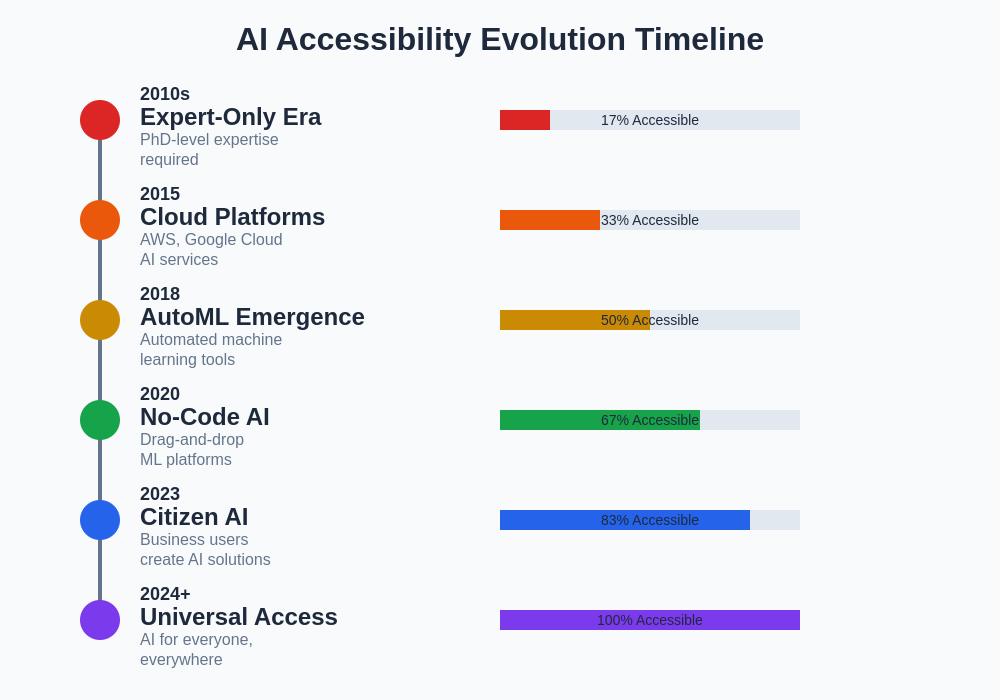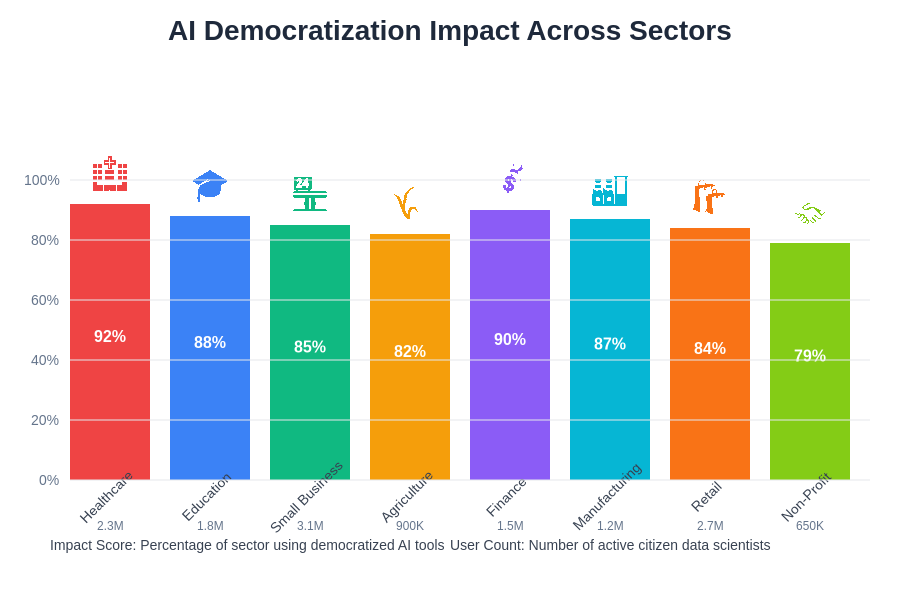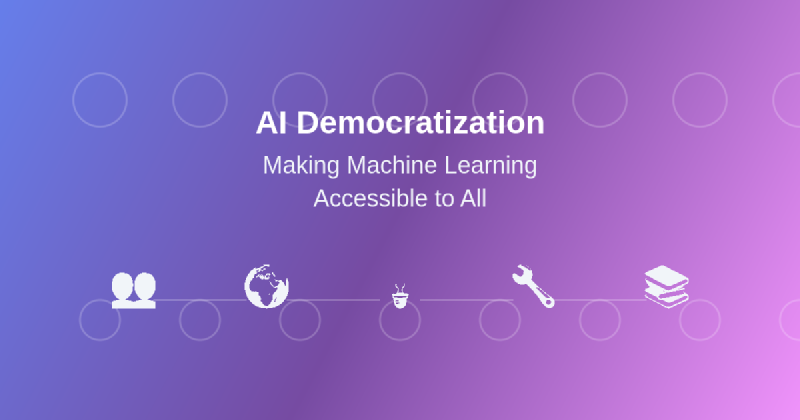The revolutionary wave of artificial intelligence democratization is fundamentally transforming the landscape of technology accessibility, breaking down traditional barriers that once confined machine learning capabilities to elite technical circles and well-funded organizations. This paradigm shift represents one of the most significant technological equalizers of our time, empowering individuals, small businesses, and organizations across all sectors to harness the transformative power of AI without requiring extensive technical expertise or substantial financial investments.
The democratization of AI encompasses a comprehensive ecosystem of tools, platforms, and educational resources designed to make machine learning accessible to everyone, regardless of their programming background or organizational size. This movement has created unprecedented opportunities for innovation, problem-solving, and business transformation across industries that were previously excluded from the AI revolution due to technical or financial constraints.
Discover the latest AI accessibility trends to understand how rapidly evolving democratization efforts are reshaping the technological landscape and creating new opportunities for widespread AI adoption. The impact of this democratization extends far beyond mere tool availability, fundamentally changing how we approach problem-solving and innovation in virtually every sector of human activity.
The Evolution of AI Accessibility
The journey toward AI democratization began with the recognition that the transformative potential of artificial intelligence should not be limited to a privileged few with advanced technical skills and substantial computational resources. Traditional machine learning development required deep expertise in mathematics, statistics, programming, and specialized knowledge of complex algorithms and data processing techniques. This created significant barriers to entry that excluded countless individuals and organizations from participating in the AI revolution.
The emergence of democratization initiatives has systematically addressed these barriers through innovative approaches that abstract technical complexity while maintaining the power and flexibility of underlying AI systems. Cloud-based platforms, automated machine learning tools, and intuitive user interfaces have collectively transformed AI from an exclusive domain of data scientists and engineers into an accessible toolkit for business analysts, entrepreneurs, educators, and creative professionals.
This evolution has been accelerated by major technology companies and open-source communities that have invested heavily in creating accessible AI platforms, comprehensive educational resources, and supportive communities that nurture AI adoption across diverse user groups. The result is an ecosystem where anyone with a compelling use case can leverage sophisticated machine learning capabilities without navigating the traditional technical learning curve.
Breaking Down Technical Barriers
One of the most significant achievements of AI democratization has been the systematic elimination of technical barriers that previously prevented non-technical users from leveraging machine learning capabilities. Advanced automated machine learning platforms now handle complex tasks such as feature engineering, algorithm selection, hyperparameter tuning, and model optimization through intelligent automation that requires minimal user intervention.
These platforms employ sophisticated meta-learning algorithms that can automatically determine optimal approaches for specific datasets and problem types, effectively encapsulating years of machine learning expertise into user-friendly interfaces. Users can now upload datasets, specify objectives, and receive production-ready models without understanding the intricate details of gradient descent, cross-validation, or ensemble methods.
The development of no-code and low-code AI platforms has further accelerated this trend by providing visual interfaces that allow users to build, train, and deploy machine learning models through drag-and-drop interactions. These platforms translate complex algorithmic processes into intuitive workflows that mirror familiar business processes, making AI development as accessible as creating presentations or spreadsheets.
Enhance your AI journey with Claude’s advanced capabilities to experience how sophisticated AI assistance can augment human creativity and problem-solving across diverse applications and industries. The combination of automated tools and intelligent assistance creates an environment where innovation flourishes regardless of technical background.
Empowering Citizen Data Scientists
The concept of citizen data scientists has emerged as a cornerstone of AI democratization, representing individuals who can perform sophisticated data analysis and machine learning tasks without formal training in data science or computer programming. These professionals leverage democratized AI tools to extract insights, build predictive models, and drive data-driven decisions within their specific domains of expertise.
Organizations across industries have embraced the citizen data scientist model as a way to distribute analytical capabilities throughout their workforce while maintaining centralized governance and quality standards. Marketing professionals use automated machine learning to optimize campaign performance, healthcare workers deploy predictive models to improve patient outcomes, and educators leverage AI to personalize learning experiences for students.
The empowerment of citizen data scientists has created a multiplier effect where domain expertise combines with accessible AI tools to generate innovations that might not emerge from traditional data science teams. These professionals bring deep understanding of business contexts, industry challenges, and user needs that can guide AI development in directions that purely technical approaches might overlook.

The progression from exclusive technical tools to universally accessible AI platforms represents a fundamental shift in how technology innovation occurs, moving from centralized expert-driven development to distributed collaborative creation that leverages diverse perspectives and domain expertise.
Transforming Small Business Capabilities
Small and medium-sized businesses have emerged as significant beneficiaries of AI democratization, gaining access to capabilities that were previously available only to large corporations with substantial technology budgets and dedicated AI teams. Cloud-based AI services now provide small businesses with access to state-of-the-art machine learning models, natural language processing capabilities, and computer vision tools through affordable subscription models.
These businesses can now implement sophisticated customer service chatbots, develop personalized recommendation systems, optimize inventory management through demand forecasting, and enhance marketing effectiveness through automated customer segmentation. The democratization of AI has leveled the competitive playing field by providing small businesses with tools to compete effectively against larger organizations in areas where AI-driven efficiency and personalization create significant advantages.
The economic impact of AI democratization on small businesses extends beyond operational improvements to include new business model opportunities and revenue streams. Entrepreneurs can now build AI-powered products and services without substantial upfront investments in technology infrastructure or specialized talent, fostering innovation and economic growth across diverse sectors.
Educational Revolution and Skill Development
Educational institutions and online learning platforms have played crucial roles in AI democratization by developing comprehensive curricula that make machine learning concepts accessible to learners with diverse backgrounds and learning objectives. These educational initiatives combine theoretical foundations with practical, hands-on experiences using democratized AI tools and platforms.
The availability of interactive learning environments, real-world datasets, and project-based learning approaches has enabled millions of learners to develop AI literacy and practical skills without pursuing formal computer science education. Massive open online courses, bootcamps, and certification programs provide structured pathways for individuals to develop competencies in AI application and implementation.
This educational revolution has created a virtuous cycle where increased AI literacy drives demand for more accessible tools, which in turn encourages further innovation in democratization technologies. The result is a rapidly expanding community of AI practitioners who bring diverse perspectives and applications to the field.
Explore comprehensive AI research capabilities with Perplexity to access cutting-edge information and insights that support continuous learning and skill development in the rapidly evolving field of artificial intelligence. The combination of accessible tools and comprehensive information resources creates an optimal environment for AI skill development.
Industry-Specific Applications and Solutions
AI democratization has enabled the development of industry-specific solutions that address unique challenges and opportunities within particular sectors. Healthcare organizations use accessible AI tools to improve diagnostic accuracy, pharmaceutical companies accelerate drug discovery processes, and medical researchers identify patterns in complex biological data without requiring extensive programming expertise.
The financial services industry has embraced democratized AI for fraud detection, risk assessment, customer service automation, and algorithmic trading strategies. Retail organizations leverage accessible machine learning platforms for inventory optimization, price optimization, customer behavior analysis, and supply chain management. Agriculture benefits from AI-powered solutions for crop monitoring, yield prediction, and resource optimization.
These industry-specific applications demonstrate how democratization enables domain experts to apply AI effectively within their areas of expertise, resulting in innovations that combine deep industry knowledge with powerful machine learning capabilities. The sector-specific focus ensures that AI implementations address real-world challenges and deliver measurable value to organizations and their stakeholders.
Overcoming Resource and Infrastructure Constraints
Traditional machine learning development required significant computational resources, specialized hardware, and extensive infrastructure investments that created substantial barriers for individuals and smaller organizations. Cloud computing and AI-as-a-Service platforms have eliminated these constraints by providing on-demand access to powerful computing resources and pre-trained models through pay-as-you-use pricing models.
These platforms handle complex infrastructure management, automatic scaling, and resource optimization, allowing users to focus on problem-solving and application development rather than technical infrastructure concerns. The availability of pre-trained models for common tasks such as image recognition, natural language processing, and speech recognition further reduces the resources required to implement sophisticated AI capabilities.
The democratization of computational resources has enabled experimentation and innovation at unprecedented scales, allowing individuals and small teams to test ideas, iterate rapidly, and develop solutions that would have been prohibitively expensive under traditional infrastructure models. This accessibility has fostered a culture of innovation where creative solutions can emerge from unexpected sources.
Addressing Ethical Considerations and Responsible AI
The democratization of AI brings important responsibilities regarding ethical considerations, bias mitigation, and responsible deployment of machine learning systems. Accessible AI platforms increasingly incorporate built-in safeguards, bias detection tools, and ethical guidelines that help users develop responsible AI solutions without requiring deep expertise in AI ethics and fairness.
Educational initiatives accompanying democratization efforts emphasize the importance of responsible AI development, including consideration of potential societal impacts, privacy protection, and fairness across different user groups. These programs help ensure that widespread AI adoption occurs within frameworks that promote beneficial outcomes while minimizing potential risks.
The development of explainable AI tools and transparent model evaluation methods enables non-technical users to understand how their AI systems make decisions, supporting accountability and trust in democratized AI applications. This transparency is crucial for maintaining public confidence in AI systems as they become more prevalent across society.

The widespread adoption of accessible AI tools across diverse sectors demonstrates the transformative potential of democratization efforts, creating value and innovation opportunities that extend far beyond traditional technology industries.
Future Directions and Emerging Opportunities
The future of AI democratization promises even greater accessibility through advances in natural language interfaces, automated reasoning, and context-aware AI systems that can understand user intentions and automatically configure appropriate machine learning solutions. These developments will further reduce technical barriers while expanding the range of problems that can be addressed through democratized AI tools.
Emerging technologies such as federated learning, edge computing, and specialized AI hardware will enable democratized AI deployment in new contexts and applications, including privacy-sensitive environments, resource-constrained devices, and real-time processing scenarios. These advances will expand the accessibility of AI capabilities to environments and use cases that are currently challenging to address.
The integration of AI democratization with other emerging technologies such as blockchain, Internet of Things, and augmented reality will create new opportunities for innovation and value creation across diverse applications and industries. These convergent technologies will enable new forms of human-AI collaboration that leverage the strengths of both human creativity and machine intelligence.
Measuring Success and Impact
The success of AI democratization can be measured through various indicators including the diversity of AI practitioners, the breadth of applications across different sectors, the economic impact on small businesses and developing regions, and the emergence of innovative solutions that address previously unsolved problems. These metrics demonstrate the tangible benefits of making AI accessible to broader audiences.
Research studies and industry reports consistently show positive correlations between AI democratization initiatives and increased innovation, economic growth, and problem-solving capabilities across diverse communities and organizations. The quantitative evidence supports continued investment in democratization efforts as a strategy for maximizing the societal benefits of artificial intelligence.
The long-term impact of AI democratization will likely be measured through improvements in quality of life, economic opportunity, educational outcomes, and the ability of diverse communities to address local challenges through accessible AI tools and resources. These outcomes represent the ultimate goals of democratization efforts.
Global Perspectives and Cultural Considerations
AI democratization takes different forms across various cultural contexts and geographic regions, reflecting local needs, resources, and technological infrastructure. Developing countries benefit from mobile-first AI platforms that leverage widespread smartphone adoption, while rural communities gain access to AI-powered solutions for agriculture, healthcare, and education through simplified interfaces and offline capabilities.
Cultural considerations influence how democratized AI tools are designed and deployed, ensuring that solutions respect local values, languages, and social structures while providing meaningful benefits to diverse communities. This cultural sensitivity is essential for successful global AI democratization efforts.
International collaboration and knowledge sharing initiatives support AI democratization by enabling communities to learn from successful implementations in other regions while adapting approaches to local contexts and requirements. These collaborative efforts accelerate the global spread of accessible AI capabilities.
The continued evolution of AI democratization represents one of the most significant opportunities to harness artificial intelligence for broad societal benefit while ensuring that the transformative power of these technologies is available to all members of society regardless of their technical background, financial resources, or geographic location. The success of these efforts will ultimately determine whether AI serves as a force for increased equality and opportunity or becomes another source of technological division.
Disclaimer
This article is for informational purposes only and does not constitute professional advice. The views expressed are based on current understanding of AI democratization trends and their societal implications. Readers should conduct their own research and consider their specific requirements when implementing AI solutions. The effectiveness and appropriateness of democratized AI tools may vary depending on specific use cases, organizational contexts, and local regulations.
